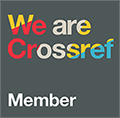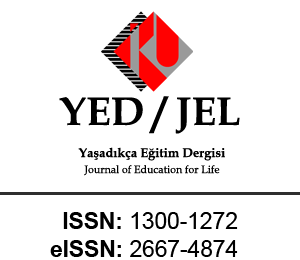Okul Psikolojik Danışmanlarının Örgütsel Kimliğinin Yordayıcısı Olarak Etik Değerler ve İş Doyumu
DOI:
https://doi.org/10.33308/26674874.2025393964Anahtar Kelimeler:
Okul Psikolojik Danışmanı- Örgütsel Kimlik- Etik Değerler- İş DoyumuÖzet
Bu çalışma, etik değerler ve iş doyumunun Türk okul psikolojik danışmanlarının örgütsel kimlik algılarını nasıl yordadığını, 2020 Rehberlik ve Psikolojik Danışma Hizmetleri Yönetmeliği (RPDHY) çerçevesinde incelemektedir. Araştırmada, Etik Değerlere Yatkınlık Ölçeği, Öğretmen Örgütsel Kimlik Algısı Ölçeği ve Minnesota İş Doyumu Anketi kullanılarak 204 okul psikolojik danışmanından veri toplanmıştır. Regresyon analizine göre, etik değerler ve iş doyumu örgütsel kimliği anlamlı bir şekilde yordamaktadır (R²=.28, p<.01). Bulgular, yeni RPDHY ile güçlendirilen mesleki kimliğin önemli bir yasal ilerleme olduğunu göstermektedir. Etik ilkelere bağlılık ve iş doyumu, örgütsel kimliği geliştirmede kritik bir rol oynamaktadır. Çalışma, kurumsal politikaların etik standartlarla uyumlu hâle getirilmesi ve iş doyumu ile kimlik gelişimini hedefleyen eğitim programlarının uygulanması gerektiğini önermektedir. Bu araştırma, Türkiye’de okul psikolojik danışmanlığının profesyonel yapısını şekillendirmede 2020 RPDHY’nin belirleyici rolünü vurgulayarak literatüre katkı sunmaktadır.
İndirmeler
Referanslar
Altan, M. Z. (2020). Education as a social system in the face of future challenges. Education Reform Journal, 5(1), 1-7. DOI: https://doi.org/10.22596/erj2020.05.01.1.7
Arslan, Ü., Karataş, U. Y., & Dostuoğlu, E. (2019). Psikolojik danışmanlık alanında mevcut ve gelişen etik sorunlar [Current and emerging ethical issues in the field of counseling psychology]. Mersin University Journal of the Faculty of Education, 15(1), 86-103. DOI: https://doi.org/10.17860/mersinefd.515865
Arslan, Ü. & Sommers‐Flanagan, J. (2018). Ethical beliefs of counseling students in Turkey. Pamukkale Üniversitesi Eğitim Fakültesi Dergisi/PAU Journal of Education, 44, 196- 212. DOI: https://doi.org/10.9779/PUJE.2018.214
Aydin, F., & Odaci, H. (2020). School counsellors' job satisfaction: what is the role of counseling self-efficacy, trait anxiety and cognitive flexibility? Journal of Psychologists and Counsellors in Schools, 30(2), 202-215. DOI: https://doi.org/10.1017/jgc.2019.32
Baycan, F. A. (1985). An analysis of the several aspects of job satisfaction between different occupational groups [Unpublished master's thesis]. Boğaziçi University.
Bond, T. (2015). Standards and ethics for counseling in action (4th Edition). Sage Publications.
Boyacı, M. (2020). Management of guidance services. In İ. H. Karataş & E. Dede (Eds.), Management of educational institutions: Theory, research, and practice (pp. 135-158). Nobel Academic Publishing.
Boyacı, M. (2019). The role of self-esteem in predicting pedagogical formation students' career adaptabilities. International Journal of Contemporary Educational Research, 2(6), 205-214. DOI: https://doi.org/10.33200/ijcer.555624
Brinkman, S. (2019). Teachers' beliefs and educational reform in India: from 'learner-centered' to 'learning-centered’ education. Comparative Education, 55(1), 9-29. DOI: https://doi.org/10.1080/03050068.2018.1541661
Camadan, F. (2018). Psikolojik danışmanın yaşadığı çatışma: etik ikilem. Sakarya Üniversitesi Eğitim Fakültesi Dergisi, 8(1), 76-94. DOI: https://doi.org/10.19126/suje.333613
Capuzzi, D. & Gross, D. R. (2017). Introductıon to the counselıng professıon. John Wiley & Sons. DOI: https://doi.org/10.4324/9781315537061
Cervoni, A., & DeLucia-Waack, J. (2011). Role conflict and ambiguity as predictors of job satisfaction in high school counselors. Journal of School Counseling, 9, 1-30.
Crothers, L. M., Hughes, T. L., Kolbert, J. B., & Schmitt, A. J. (2020). Theory and cases in school-based consultation: A resource for school psychologists, school counselors, special educators, and other mental health professionals. Routledge. DOI: https://doi.org/10.4324/9780429029974
Creswell, J. W. (2012). Research design: Qualitative, quantitative, and mixed methods approaches (Fourth Ed.). Pearson Education.
Fraenkel, J. R., Wallen, N. E. & Hyun, H. H. (2012). How to design and evaluate research in education. McGraw-Hill.
George, D., & Mallery, P. (2024). IBM SPSS Statistics 29 Step by Step: A Simple guide and reference, 23.0 update (14th ed.). Routledge. DOI: https://doi.org/10.4324/9781032622156
Gillen, M. C., Howells, R. C., & Mercer, V. (2024). Simple not easy: A phenomenological study of school counselor clinical supervision experiences. International Journal for the Advancement of Counselling, 46(1), 113-129. DOI: https://doi.org/10.1007/s10447-023-09537-w
Güneş, B. (2020). Factors affecting the job satisfaction of psychological counselors. Bartın University Journal of Educational Research, 4(2), 58–70.
Heydari, M., Faghih, M., Karimzadeh, Y., Joulaei, H., Qhiasi, F., Dadmanesh, N., ... & Mehraeen, M. (2022). Investigation of job satisfaction amongst voluntary, counseling and testing centers and health centers in Iran. BMC Psychology, 10(1), 258. DOI: https://doi.org/10.1186/s40359-022-00972-9
Hongryun, W., Junfei L., Chaiqua H., & Bridget, C. (2017). Professional identity development in counseling professionals. Counseling Outcome Research and Evaluation, 8(1), 15-30. DOI: https://doi.org/10.1080/03054985.2017.1297184
Hunsmann, J. J., Ay-Bryson, D. S., Kobs, S., Behrend, N., Weck, F., Knigge, M., & Kühne, F. (2024). Basic counseling skills in psychology and teaching: validation of a short version of the counselor activity self-efficacy scales. BMC Psychology, 12(1), 32. DOI: https://doi.org/10.1186/s40359-023-01506-7
İkiz, F. E., Sevinç, A., Kaval, A., Yeğintürk, G. & Kalen, S. (2017). Okul psikolojik danışma hizmetlerinde mesleki etik ihtiyaçların belirlenmesi. İş Ahlakı Dergisi, 10, 223˗245.
Jodoin, E. C., & Ayers, D. F. (2017). Communication conflict styles, perception of ethical environment, and job satisfaction among college and university counselors. Journal of College Counseling, 20(2), 139-153. DOI: https://doi.org/10.1002/jocc.12066
Johnston, S. P. & Tarvydas, V. M. (2019). Legal issues, ethics of practice, and counselor behaviors. Clinical Mental Health Counseling: Practicing in Integrated Systems of Care, 42(4), 323–338. DOI: https://doi.org/10.1891/9780826131089.0008
Kağan, M. (2010). An investigation of job satisfaction of guidance teachers working in public and private primary schools and guidance and research centers in Ankara. Erzincan University Journal of Education Faculty, 12(1), 39–55.
Kaya, İ. (2015). Etik Değerlere Yatkınlık Ölçeği: geçerlik ve güvenirlik çalışması [The study of validity and reliability: The Inclination to Ethical Values Scale]. Journal of International Social Research, 8(41), 968-973. DOI: https://doi.org/10.17719/jisr.20154115078
Kim, N., & Lambie, G. W. (2018). Burnout and implications for professional school counselors. Professional Counselor, 8(3), 277-294. DOI: https://doi.org/10.15241/nk.8.3.277
King-White, D., Kurt, L., & Seck, M. (2019). A qualitative study of online school counselors’ ethical practices in K-12 Schools. Journal of Counselor Practice, 10(1), 40-58.
Kolay-Akfert, S. (2012). Ethical dilemmas experienced by psychological counselors working in different institutions and their attitudes and behaviors toward these dilemmas. Educational Sciences: Theory & Practice, 12(3), 1791–1812.
Kuzgun, Y. (2016). Rehberlik ve psikolojik danışmada unvan sorunu. Türk Psikolojik Danışma ve Rehberlik Dergisi, 1(1), 32-38.
Li, L., Kanchanapoom, K., Deeprasert, J., Duan, N., & Qi, Z. (2025). Unveiling the factors shaping teacher job performance: Exploring the interplay of personality traits, perceived organizational support, self-efficacy, and job satisfaction. BMC Psychology, 13(14), 1–13. DOI: https://doi.org/10.1186/s40359-024-02324-1
Ministry of National Education [MEB]. (2020a). Guidance and psychological counseling services regulation. https://www.resmigazete.gov.tr/eskiler/2020/08/20200814-2.htm
Ministry of National Education [MEB]. (2020b). Ethical guidelines for guidance and psychological counseling services. https://orgm.meb.gov.tr/meb_iys_dosyalar/2020_08/31230349_RPDH_Etik_Yonergesi_.pdf
Mullen, P. R., Blount, A. J., Lambie, G. W., & Chae, N. (2017). School counselors’ perceived stress, burnout, and job satisfaction. Professional School Counseling, 21(1), 1-10. DOI: https://doi.org/10.1177/2156759X18782468
Myers, D. G., & Twenge, J. M. (2018). Exploring social psychology (Eighth Edition). McGraw-Hill.
Neyland-Brown, L., Francis, J. D., & Burns, G. (2019). Role responsibilities, time commitments, and counseling activities of Ohio-licensed school counselors. Journal of Counselor Practice, 10(1), 1-18.
Özkan, A. (2017). Legal and regulatory arrangements required for counselor education and the professional identity development of the profession [Unpublished master's thesis]. Balıkesir University.
Özyürek, R. (2019). Psikolojik danışman eğitimi ve mesleğin profesyonel kimlik gelişimi için gereksinim duyulan yasa ve yönetmelik düzenlemeleri. Türk Psikolojik Danışma ve Rehberlik Dergisi, 9(56), 883–908.
Sivis-Cetinkaya, R. (2019). A combined approach to teaching counseling ethics: a preliminary study. British Journal of Guidance & Counseling, 47(3), 274-282. DOI: https://doi.org/10.1080/03069885.2017.1379594
Tabachnick, B. G. & Fidell, L. S. (2013). Using multivariate statistics (Sixth ed.). Pearson.
Tabak, H. & Boyacı, M. (2019). Development of Teacher Organizational Identity Perception Scale (TOIPS): validity and reliability study. Mehmet Âkif Ersoy Üniversitesi Eğitim Fakültesi Dergisi, (52), 96-117. DOI: https://doi.org/10.21764/maeuefd.568144
Tuzgöl-Dost, M., & Keklik, İ. (2012). Professional issues in counseling as perceived by individuals working in counseling settings. Mehmet Akif Ersoy University Journal of Education Faculty, 12(23), 389–407.
Weiss, D. J., Dawis, R. V., England, G. W., & Lofquist, L. H. (1967). Manual for the Minnesota Satisfaction Questionnaire: Minnesota studies in vocational rehabilitation. Industrial Relations Center, University of Minnesota. DOI: https://doi.org/10.1037/t05540-000
Yıldız-Akyol, E., & Boyacı, M. (2020). Cognitive flexibility and positivity as predictors of career future in university students. Türk Psikolojik Danışma ve Rehberlik Dergisi, 10(57), 297-320.
İndir
Yayınlanmış
Nasıl Atıf Yapılır
Sayı
Bölüm
Lisans
Telif Hakkı (c) 2025 Mehmet Boyacı

Bu çalışma Creative Commons Attribution-NonCommercial-NoDerivatives 4.0 International License ile lisanslanmıştır.
Sisteme yüklemiş olunan makalenin kapsamı, sunduğu bulgular ve sonucu ve yorumları konusunda Yaşadıkça Eğitim [YE] dergisi Sahibi, Editör, Editör Yardımcısı, Hakemler ve Editör Kurulu'nun hiçbir sorumluluk taşımadığını kabul ederim.
Makalenin özgün olduğunu, herhangi bir başka dergiye yayımlanmak üzere gönderilmediği, daha önce yayımlanmadığını Yaşadıkça Eğitim [YE] dergisi Editörlüğü'ne beyan ederim.
Başlığı belirtilen makalenin, 5846 sayılı Fikir ve Sanat Eserleri Yasasının 22. maddesi gereğince çoğaltma, 23. maddesi gereğince yayma ve 25. maddesi gereğince her türlü taşıyıcı materyal üzerinde veya elektronik ortamda kamuya iletim haklarını Yaşadıkça Eğitim [YE] dergisine karşılıksız, koşulsuz ve süresiz olarak devredildiği, makale ile ilgili devredilen hakların dilediği zaman, mekan ve koşullarda kullanmaya Yaşadıkça Eğitim [YE] dergisinin yayıncısı olarak İstanbul Kültür Üniversitesi'nin yetkili kılınacağını onaylarım.





